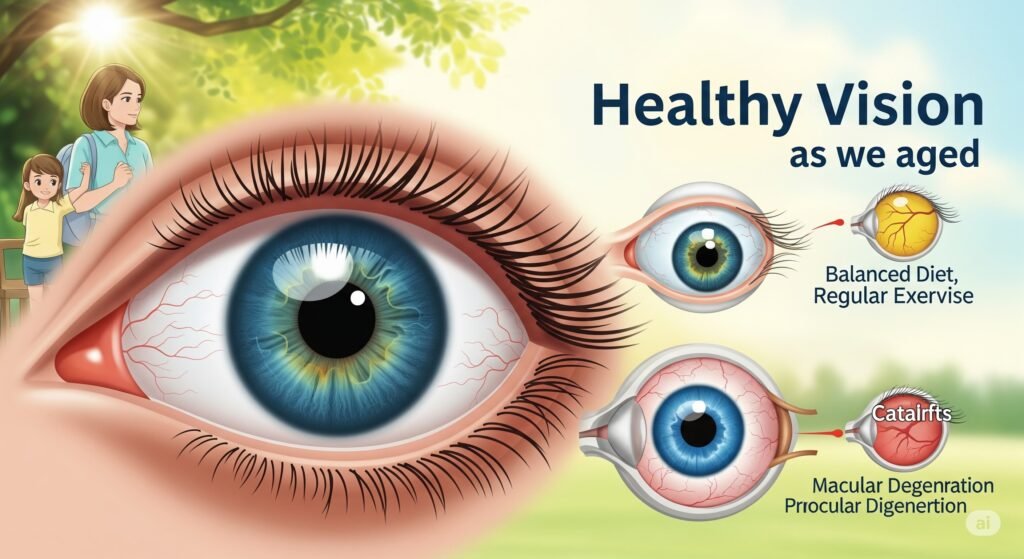As we age, our bodies undergo various changes, and our vision is no exception. Maintaining healthy vision is crucial for enjoying a high quality of life, staying independent, and continuing to engage in the activities we love. Here’s how you can take proactive steps to protect your sight as you get older.
Regular Eye Exams
Routine eye exams are the cornerstone of vision health. They can detect problems early when they’re most treatable.
- Frequency: The American Academy of Ophthalmology recommends a comprehensive eye exam every one to two years for adults over 65, or more frequently if you have risk factors like diabetes or a family history of eye disease.
- What to expect: Your eye doctor will check your vision, eye pressure, and the overall health of your eyes, looking for signs of glaucoma, cataracts, macular degeneration, and other age-related conditions.
Eat a Balanced Diet
What you eat affects your eyes, just like the rest of your body.
- Key nutrients: Include plenty of fruits, vegetables (especially leafy greens), and omega-3 fatty acids (found in fish). These nutrients help protect against macular degeneration and cataracts.
- Vitamins: Vitamins C and E, zinc, and lutein are particularly beneficial for eye health.
Protect Your Eyes from the Sun
Prolonged exposure to the sun’s ultraviolet (UV) rays can increase your risk of cataracts and macular degeneration.
- Sunglasses: Wear sunglasses that block 99% to 100% of both UVA and UVB rays.
- Hats: Wear a wide-brimmed hat to provide additional protection.
Manage Existing Health Conditions
Conditions like diabetes and high blood pressure can affect your vision.
- Diabetes: Can lead to diabetic retinopathy, a leading cause of blindness.
- High blood pressure: Can damage blood vessels in the eyes.
- Control: Keep these conditions under control through diet, exercise, and medication as prescribed by your doctor.
Avoid Smoking
Smoking increases your risk of developing cataracts, macular degeneration, and optic nerve damage.
- Quit: If you smoke, quitting is one of the best things you can do for your overall health, including your vision.
Stay Active
Regular exercise improves blood circulation, which is beneficial for eye health.
- Benefits: Exercise can lower your risk of developing diabetes and high blood pressure, both of which can lead to eye problems.
Know Your Family History
Many eye diseases have a genetic component.
- Inform your doctor: Let your eye doctor know if you have a family history of glaucoma, macular degeneration, or other eye conditions.
Use Proper Lighting
Good lighting can reduce eye strain.
- Avoid glare: Position lamps to avoid glare on screens or reading materials.
- Brightness: Use adequate lighting for reading and close work.
Give Your Eyes a Break
If you spend a lot of time looking at screens, follow the 20-20-20 rule.
- 20-20-20 rule: Every 20 minutes, look at something 20 feet away for at least 20 seconds.
Stay Hydrated
Dehydration can lead to dry eyes.
- Drink water: Make sure to drink plenty of water throughout the day.
Conclusion
Maintaining healthy vision as you age involves a combination of regular check-ups, a healthy lifestyle, and proactive measures to protect your eyes. By following these tips, you can help ensure that your vision remains clear and strong for years to come.










